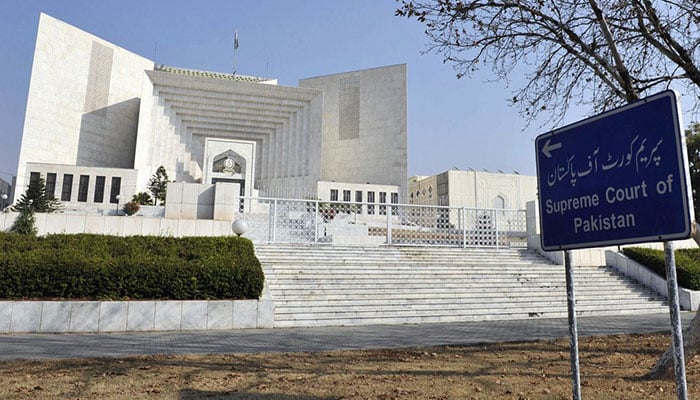- Three petitions filed under Article 184(3) to set aside the bill.
- 8-member bench is headed by CJP Umar Ata Bandial.
- None of the judges who questioned CJP powers included in bench.
ISLAMABAD: An eight-member bench of the Supreme Court will take up three petitions challenging the Supreme Court (Practice and Procedure) Bill 2023 amidst a boycott of court proceedings by the country’s top lawyers body in protest “against fixation of pleas in haste”.
A late-night announcement, made by PBC Vice Chairman Haroonur Rashid and Executive Committee Vice Chairman Hassan Raza Pasha, said that the chief justice constituted the bench in haste for hearing the petitions.
They said that the lawyers’ community would boycott the court proceedings across the country on Thursday.
Earlier this week, the bill — clipping CJP powers — was passed by a joint sitting of parliament after President Dr Arif Alvi returned it.
Subsequently, three separate petitions were filed by Raja Amer Khan, Chaudhry Ghulam Hussain and Mohammad Shafay Munir, among others, under Article 184(3) of the Constitution, asking the top court to set aside the bill.
The bench will be headed by Chief Justice of Pakistan (CJP) Umar Ata Bandial and comprises Justice Ijaz ul Ahsan, Justice Munib Akhtar, Justice Sayyed Mazahar Ali Akbar Naqvi, Justice Muhammad Ali Mazhar, Justice Ayesha Malik, Justice Syed Hasan Azhar Rizvi and Justice Shahid Waheed.
None of the judges who raised questions on the powers of the CJP have been included in the bench.
The petitions will be heard at 11:30am, according to the supplementary cause list uploaded on the Supreme Court website.
The bill has also been challenged in the Islamabad High Court (IHC) by lawyer Saeed Aftab in a separate plea.
The federal government got the bill passed in a joint session of parliament on Monday after President Arif Alvi returned it last week without signing it.
The president had returned the bill to parliament for reconsideration, citing Article 75 of the Constitution, and stating that its prima-facie travels beyond the competence of parliament and can be assailed as colourable legislation.
During the chaotic joint sitting, the house approved an amendment to the SC bill, under which a judges’ committee meeting would be convened to devise rules and regulations regarding the suo motu matters. The amendment was proposed by PML-N lawmaker Shaza Fatima Khawaja.
As per the amendment, the chief justice of Pakistan or any other member of the committee can call the meeting until the rules and regulations are finalised.
The bill
The Supreme Court (Practice and Procedure) Bill, 2023 aims to give the power of taking suo motu notice to a three-member committee comprising senior judges, including the chief justice. It also aims to have transparent proceedings in the apex court and includes the right to appeal.
Regarding the formation of benches, the bill states that every cause, matter or appeal before the apex court would be heard and disposed of by a bench constituted by a committee comprising the CJP and the two senior-most judges. It added that the decisions of the committee would be taken by a majority.
Regarding the apex court’s original jurisdiction, the bill said that any matter invoking the use of Article 184(3) would first be placed before the committee.
The bill says that if the committee is of the view that a question of public importance with reference to the enforcement of any of the fundamental rights conferred by Chapter I of Part II of the Constitution is involved, it shall constitute a bench comprising not less than three judges of the SC which may also include the members of the committee, for adjudication of the matter.
On matters where the interpretation of the Constitution is required, the bill said the committee would compose a bench comprising no less than five apex court judges for the task.
Regarding appeals for any verdict by an apex court bench that exercised jurisdiction under Article 184(3), the bill said that the appeal would have to be filed within 30 days of the bench’s order for a larger SC bench. It added that the appeal would be fixed for hearing within a period not exceeding 14 days.
It added that this right of appeal would also extend retrospectively to those aggrieved persons against whom an order was made under Article 184(3) prior to the commencement of the SC (Practice and Procedure) Bill, 2023 on the condition that the appeal was filed within 30 days of the act’s commencement.
The bill additionally said that a party would have the right to appoint its counsel of choice for filing a review application under Article 188 of the Constitution.
Furthermore, it states that an application pleading urgency or seeking interim relief, filed in a cause, appeal or matter, shall be fixed for hearing within 14 days from the date of its filing.
The bill said that its provisions would have effect notwithstanding anything contained in any other law, rules, or regulations for the time being in force or judgement of any court, including the Supreme Court and high courts.


 Latest News3 days ago
Latest News3 days ago
 Latest News3 days ago
Latest News3 days ago
 Entertainment3 days ago
Entertainment3 days ago
 Latest News3 days ago
Latest News3 days ago
 Latest News3 days ago
Latest News3 days ago
 Latest News3 days ago
Latest News3 days ago
 Latest News3 days ago
Latest News3 days ago
 Latest News3 days ago
Latest News3 days ago












